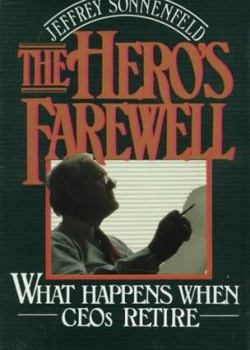The Hero's Farewell: What Happens When Ceos Retire
Select Format
Select Condition 
Book Overview
How a business replaces its chief executive is a vital issue for the firm's future. Unless the transfer of power is managed effectively, the business may be thrown into turmoil--with profound implications not only for the CEO, but also for the other employees, the shareholders, and sometimes even the industry as a whole. Yet not enough is known about this crucial moment in the history of a company.
___Filled with inside stories from corporate boardrooms and fresh conceptual perspectives, The Hero's Farewell describes in rich detail the factors that affect executive succession, focusing for the first time on the critical role a CEO's departure style plays in helping or hindering the transfer of power. Sonnenfeld has obtained candid interviews with fifty prominent retired chief executives from corporations such as AT&T, Ford, Dupont, United Technologies, and Raytheon (including Edwin Land of Polaroid, David Rockefeller of Chase Manhattan, and Tom Watson, Jr. of IBM). Through these interviews and a survey of an additional 300 top managers, he identifies the four major types of leadership departure styles: Monarchs, who choose not to leave voluntarily but either die in office or are overthrown; Generals, who leave reluctantly and spend their retirement planning a comeback; Ambassadors, who retain close ties with their former firms; and Governors, who willingly serve a limited term and leave to pursue new interests. Understanding how these leadership styles affect the transition process can enable both CEOs and their firms to better prepare for the changes to come.
___Executive successions are rarely easy, especially today when, as the author points out, many of our business leaders have become heroes. These heroes are often unwilling to surrender control of a firm to which they have dedicated their lives. Retirement deprives them of a clear sense of purpose and indeed, for many, it is equated with abdication of responsibility and even death. Yet some retiring leaders exit constructively, starting new lives for themselves and leaving behind a firm that is capably managed.
___Capturing the human drama of these departures and succession battles, The Hero's Farewell will fascinate anyone intrigued by power struggles in large corporations. More important, in outlining the ways to smooth out the inevitable transfers of power that corporations must face, it provides essential information for all top executives and especially for CEOs.
___Filled with inside stories from corporate boardrooms and fresh conceptual perspectives, The Hero's Farewell describes in rich detail the factors that affect executive succession, focusing for the first time on the critical role a CEO's departure style plays in helping or hindering the transfer of power. Sonnenfeld has obtained candid interviews with fifty prominent retired chief executives from corporations such as AT&T, Ford, Dupont, United Technologies, and Raytheon (including Edwin Land of Polaroid, David Rockefeller of Chase Manhattan, and Tom Watson, Jr. of IBM). Through these interviews and a survey of an additional 300 top managers, he identifies the four major types of leadership departure styles: Monarchs, who choose not to leave voluntarily but either die in office or are overthrown; Generals, who leave reluctantly and spend their retirement planning a comeback; Ambassadors, who retain close ties with their former firms; and Governors, who willingly serve a limited term and leave to pursue new interests. Understanding how these leadership styles affect the transition process can enable both CEOs and their firms to better prepare for the changes to come.
___Executive successions are rarely easy, especially today when, as the author points out, many of our business leaders have become heroes. These heroes are often unwilling to surrender control of a firm to which they have dedicated their lives. Retirement deprives them of a clear sense of purpose and indeed, for many, it is equated with abdication of responsibility and even death. Yet some retiring leaders exit constructively, starting new lives for themselves and leaving behind a firm that is capably managed.
___Capturing the human drama of these departures and succession battles, The Hero's Farewell will fascinate anyone intrigued by power struggles in large corporations. More important, in outlining the ways to smooth out the inevitable transfers of power that corporations must face, it provides essential information for all top executives and especially for CEOs.
Format:Hardcover
Language:English
ISBN:0195050916
ISBN13:9780195050912
Release Date:October 1988
Publisher:Oxford University Press, USA
Length:336 Pages
Weight:1.56 lbs.
Dimensions:1.2" x 6.4" x 9.5"
Customer Reviews
2 ratings
Powerful Insights
Published by Student of Vines , 10 months ago
Good wisdom ages well. Sonnenfeld offers a unique and touching level of empathy for those at the top of their game facing inevitable transition. The alternative to well-planned succession is the kind of turmoil we too often see that serves no one well. Understanding how that drama can be avoided requires uncanny vision and selflessness that often runs counter to the traits of top leadership. This lessons of this book merge logic with passion, strategy with emotion, broad good with personal adjustment. It’s a masterful treatment of a delicate topic. It’s eye-opening and inspiring all at once.
Finishing Well
Published by Thriftbooks.com User , 18 years ago
While a bit dated, this book is one of the most important assessments of the ways strong leaders retire. The four-fold typology of retirees as monarchs, generals, ambassadors and governors is well anchored to credible research providing a helpful way for senior leaders to categorize their leadership style and anticipate the nature of their final departure. The identification of the three sets of tensions faced in the departure of the corporate hero (1) within the leader, (2) across generations of leaders and (3) between leaders and the wider community provide significant insight into the psychological and socio-cultural realities of retirement.





